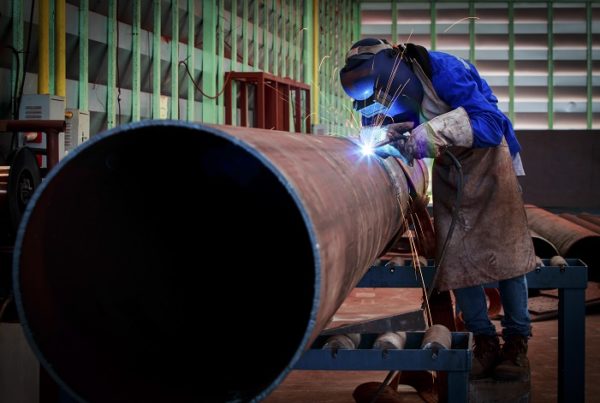 Steel pipe fabricators are experts in the manufacturing and fabricating of steel pipes, fittings and related materials. These fabricators are skilled in working with steel and deeply understand its properties, characteristics and behavior under different conditions. They manufacture steel pipes for various industries, including oil and gas, construction, water supply and wastewater management.
Steel pipe fabricators are experts in the manufacturing and fabricating of steel pipes, fittings and related materials. These fabricators are skilled in working with steel and deeply understand its properties, characteristics and behavior under different conditions. They manufacture steel pipes for various industries, including oil and gas, construction, water supply and wastewater management.
They use advanced fabrication methods, cutting-edge tools and equipment and stringent quality control processes to ensure the production of top-notch products that meet or exceed industry standards.
Steel Pipe Fabricators Opening a Shop: Convenience is the Key
Steel fabricators prefer to open a shop in locations that offer convenient access to raw materials, skilled labor and transportation facilities.
Proximity to major transportation networks
The fabricators need to transport their products to various locations and thus they prefer locations that offer easy access to highways, railways, airports and seaports.
Availability of skilled labor
The fabrication industry demands skilled labor; thus, they look for locations with a pool of skilled workers or offer training programs to train new workers.
Availability of raw materials
High-quality raw materials such as steel, pipes and fittings are required; thus, they prefer locations with adequate and reliable sources of raw materials.
Access to reliable sources of energy
Locations with reliable and affordable energy sources such as electricity, natural gas and fuel are preferred.
Cost of real estate and utilities
They choose locations with affordable real estate facilities and utility costs.
Pipe Fabricator: Demanding Role in the Piping Industry
Efficient steel pipe fabricators play a crucial role in the piping industry-
Timely delivery of pipes and related materials
- Ensure their product delivery is on time to meet the deadlines of their client’s projects.
- Production of top-notch pipe fittings.
- Make sure the products meet industry standards in terms of quality, durability and safety.
Quality control processes
The products are free from defects and meet the specified requirements of their clients. Advanced testing and inspection techniques ensure quality.
Welding pipes and fittings
Experienced steel pipe fabricators use advanced welding techniques and equipment to create custom solutions that meet specific requirements.
Prevalent Fabrication Methods
Pipe fabricators use a variety of fabrication methods to manufacture high-quality products-
Assembling fittings
The fabricators use various techniques to assemble fittings, such as screwing, bolting and welding.
Welding techniques
Welding techniques such as MIG, TIG and Stick create solid and durable welds.
Prepping the surface
Ensure the surface of the pipes and fittings is clean and free from defects before welding or painting.
Accurate bending
Steel pipe manufacturers bend pipes and fittings accurately to create custom solutions to meet specific requirements.
Proper cutting
The fabricators need to be able to cut pipes and fittings accurately to generate customized solutions. Advanced cutting machines and techniques, such as plasma, water jet and laser cutting, are necessary.
Quality control measures
Performing visual inspections, ultrasonic testing, magnetic particle testing and dye penetrant testing to detect any defects in their products.
Site Fabrications Vs Shop Fabrications: Choosing the Best
Fabrication process
Site fabrications involve the fabrication of pipes and fittings on-site, while shop fabrications involve the fabrication of pipes and fittings in a dedicated shop.
Expenses
Site fabrications can be more expensive than shop fabrications because they require more labor, transportation and equipment costs.
Logistic management
Site fabrications require more logistical planning than shop fabrications because they involve transporting materials and equipment to the site.
Location of fabrication
Site fabrications take place where the pipes and fittings installation will take place, while shop fabrications select a centralized location that is convenient for transportation.
Better quality control
Shop fabrications offer better quality control than site fabrications because they allow fabricators to control the environment and conditions in which the pipes and fittings undergo fabrication.
Materials: Produced in the Shop
Pipes
Fabricators manufacture seamless, welded and coated pipes to ensure the integrity and durability of their pipes.
Pipe supports
They are used to support pipes and fittings in various systems and infrastructures.
Spools
Spools can also connect pipes and fittings for various infrastructures.
Pipe fittings
A wide range of pipe fittings includes elbows, tees, reducers, flanges and couplings.
Materials Production in Site Fabrications
Tie-ins
Tie-in services involve the connection of new pipes to existing pipelines or infrastructures.
Field joints
Field joint services can connect pipes in the field to ensure the integrity of their field joints.
Modifications and repairs
The fabricators provide modification and repair services for existing pipes and fittings.
Field fittings
Field fitting involves the installation of fittings in the field.
International Pipe: Where Quality Meets Affordability
We, International Pipe, are a leading steel pipe fabricator that specializes in providing top-notch pipe fabrication services to clients. Our team of skilled fabricators, welders and technicians has years of experience and training to deliver high-quality products and services. Whether you need a small batch of pipes or a large-scale project, we can deliver the right solution for your needs.
